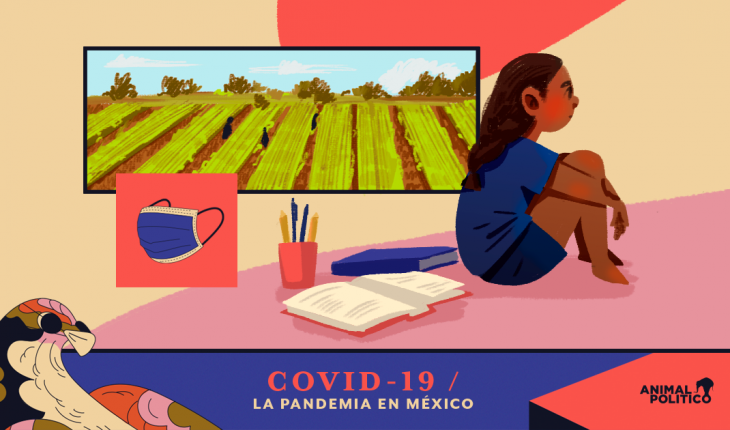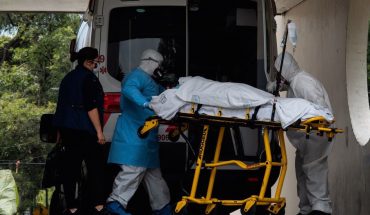jasmine Flowers, 31, indigenous tenek.
Well, here at my ranch, you haven’t felt so much about the virus, really. There have been no contagions that we know of, no one has been quarantined, and no one has lost their job in the meat factory, which is the one that gives the most employment here in the ejido Francisco Villa de San Vicente Tancuayalab, in San Luis Potosí.
I guess that’s the good thing about being isolated from the world, isn’t it? Something good must have been to live with almost no one around you and with pure countryside everywhere.
The only detail here has been the theme of children’s school. Look, I have three kids: the six-year-old, the middle of eight, and the 19th-year-old. All three of them were taken to the ejido’s primary. It’s a school with a lot of problems because it’s too old. It has no drainage, no water in the toilets, and several classrooms are literally about to fall off because they need a lot of maintenance. But, with everything, it’s the school where our kids had an education with their teachers and where they played with their companions, and they were entertained. Now, on the other hand, with the pandemic, children have been virtually lost for a year.
Read: ‘Indigenous families, or eat, or put a balance on their cell phone for children’s classes’
In the community, the class thing was tried on television, but it never worked.
First, because here most moms and dads are very low-income people, who barely and are enough to survive worthily. And if you don’t have almost to eat, because less you’re going to have to buy a TV, or to pay for the cable service, or the internet, which almost doesn’t come.
And second, because in the community there are many moms who can’t read or write, or who at most only have up to third or fourth grade. In my case, I was able to study a little more. I half defend, man. That’s why a lot of mothers come with me to ask me to shake hands with their children. And well, I do what I can and help them. But I also tell them I’m not a teacher. And that if I can barely with my children… imagine walking around tending to so much chamaco. Oh, no. It’s impossible.
Besides, I have to work too, don’t I? I have to take care of my house, run my errands, and often leave everything parked because I have to sit with my three kids in front of the TV to try to get them to cache something.
Because, you see, that’s another situation: subjects, exercises, and questions happen super fast. Children don’t have time to write everything down in their notebooks. And we don’t have the internet to then look for the repeated classes and see them calmly again.
As if that weren’t the case, we also got very complicated getting the books of the subjects. In fact, it was a mess to find them, though it will take about a month that we’ve already received. But, imagine, without teachers and without books, we were tied up everywhere. On television they would tell the children to do mathematical challenge exercises from such a page to that page, but we didn’t have the same books they used on TV. So how were we going to do those exercises? It was impossible.
That’s why, as I’m telling you, it wasn’t a success about television, it didn’t work out here. On the contrary, it’s being a mismatch, the mere truth. I feel that children, instead of improving, have greatly worsened their education in what we have been wearing as a pandemic. Some even better left school.
You may be interested: Without internet, TV or radio, three brothers in Chiapas end the school year only with a cell phone
For example, in the primary of the ejido a child was desumed because his mother, flat, could no longer afford copies of the booklets with the tasks. And because the child has already lost interest in continuing to study and preferred to go to the countryside, to work with his father. And at higher levels I’ve also heard of young people who preferred to drop out of school because they weren’t learning and at home they need hands to help bring a plate of food.
The economic situation, which in itself was already bad and with the tantito pandemic worse, is also not helping parents keep their children studying. Because look, it’s true that not all parents have the same interest in giving their children an education. But it is also true that in many cases, even if the parents want to, there comes a point where you can no longer.
Both father and mother have to go out, and they can’t leave the children alone in the house all day. So many have no choice but to take them with them, and that makes everything careless and that the children no longer want to study.
Now, in the ejido you already begin to hear that by the end of August, face-to-face classes may return, although there is still nothing concrete. Me, he sees her.I don’t know what to think about this, because I don’t know how safe it’s going to be for kids about contagion.
In fact, it is being said that we will be given a resuscover to every dad where the authorities are de-eding any possible contagion, and that the only ones responsible would be us.
These are things you hear, aren’t they? No one has formally told us anything. But among the parents there is already a lot of fear for this situation. Although, on the other hand, we also have a lot of need for our children to return to their normal classes. For your education, of course, but also so that we can get on with our work.
So, as you can see, we’re facing a big dilemma.
What we do at Animal Politics requires professional journalists, teamwork, dialogue with readers and something very important: independence. You can help us keep going. Be part of the team.
Subscribe to Political Animal, receive benefits and support free journalism #YoSoyAnimal.





